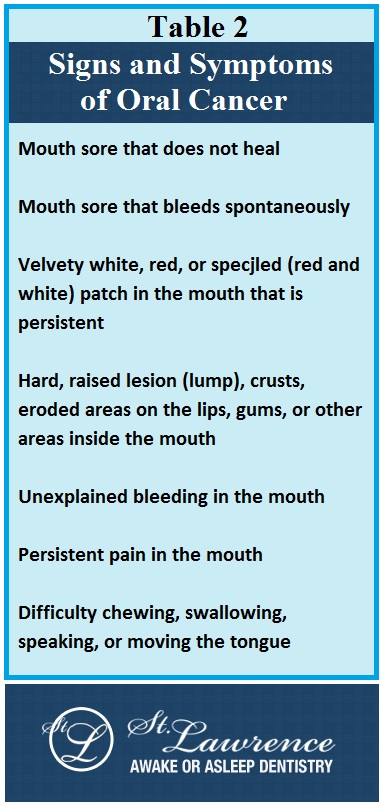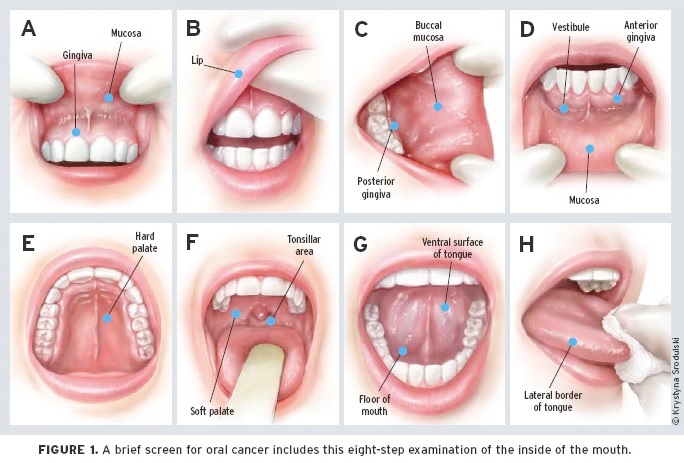Oral cancer, for those who are not aware, accounts for an estimated 4% of all cancers diagnosed and is the sixth most common cancer in the country today. Oral cancer is diagnosed mostly in male patients over the age of 45 years. It’s twice as likely to be diagnosed in men as in women. And as in any other type of cancer, the key to oral cancer is early diagnosis. About 70% survival rate is claimed for oral cancer diagnosed at the earliest stages. Unfortunately, as in other cancer, most patients are not diagnosed early, thus reducing the number of cured patients to just less than 50 percent of all oral cancer patients.
Among all cancer types, oral cancer has the worst five year survival rate at about 57 percent. Oral cancer can easily spread if it is not diagnosed and treated early. It can lead to chronic pain, severe facial and oral disfigurement, loss of function, and even death. There are statistics showing that about 8,000 deaths every year is due to oral cancer.
Oral Cancer Screening
The best way to get an early diagnosis for a breast cancer is a mammogram. For oral cancers, dentists include an oral cancer screening in a regular dental examination. It is done in one of two ways: a soft tissue examination, or using Velscope oral cancer screening system. Some dentists do visual inspection of the oral cavity to look for any sores or discolored tissues, and palpation of the head, neck and oral cavity to feel lumps or irregular tissue changes. The use of Velscope oral cancer screening system is a non-invasive procedure where a blue light is used to emphasize any changes in the mouth that visual inspection cannot see.
Causes of Oral Cancer
There is no known single cause of oral cancer but there are some factors that increase the risk of developing it. They include:
- Smoking, chewing tobacco or using snuff
- Heavy alcohol drinking
- Chewing betel nut
- Sun exposure to the lips
- Infection of the oral cavity with the human papillomavirus (HPV) may also be a risk factor for oral cancer.
However, some people develop oral cancer without any of these risk factors.
Symptoms of Oral Cancer
Like other cancers, oral cancer manifests warning signs found in the different areas or sites where oral cancer can start showing, such as:
- Swellings or thickenings, lumps or bumps, rough spots, crusts, or eroded areas on the lips, gums, or other areas inside the mouth
- Velvety white, red or speckled patches in the mouth
- Bleeding in the mouth for unknown reasons
- Numbness, loss of feeling, pain or tenderness in any area of the face, neck or mouth
- Non-healing sores on the mouth, face or neck that bleed easily
- Persistent sore throat
- Chewing , swallowing problem
- Difficulty speaking, or moving the jaw or tongue
- Change in voice (hoarseness), chronic sore throat
- Ear pain
- Dramatic weight loss
These symptoms are difficult to self-diagnose and a dental examination is highly recommended if any of these signs are noticed.
Treatment of Oral Cancer
If the oral cancer screening yields results pointing to the possibility of oral cancer, a biopsy will be performed in the suspected area to confirm the diagnosis of oral cancer. Treatment for oral cancer, like other types of cancer, involves surgery or the removal of the cancerous growth. This will be followed by radiation therapy or chemotherapy aimed at killing any remaining cancer cells.
Prevention
To prevent oral cancer, the following measures are deemed necessary:
- Avoiding smoking, or using any tobacco products
- Drinking alcohol in moderation
- Eat a well balanced diet with lots of fruits and vegetables
- Avoid sun exposure. Use a UV-A/B blocking sun protective lotions on the skin and the lips as these are more prone to cancer
Oral cancer can affect anyone regardless of age and gender. Hence it is important to have regular screenings for this deadly cancer. You can always ask your dentist about the latest development and technologies for diagnosing oral cancer. Velscope is one such innovation that helps dentist diagnose any oral cancer signs early.
If you regularly visit your dentist, ask him/her about oral cancer screening procedure to schedule your oral cancer screening. Prevention is better than cure sounds like an old cliche but it does make sense. Having great, strong pearly whites does not end in regular dental prophylaxis and check-up; it includes good oral health.
- St. Lawrence Dentistry Looks Forward To St. Patrick’s Day! - March 12, 2025
- Understanding Dental X-Rays and Radiation: What You Should Know - January 13, 2025
- Happy New Year from St. Lawrence Dentistry! - December 30, 2024











